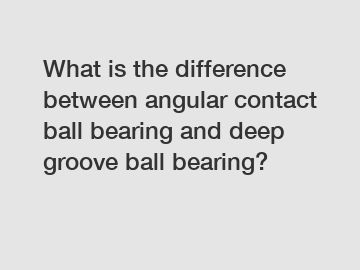What is the difference between angular contact ball bearing and deep groove ball bearing?
Welcome to our comprehensive discussion on the distinctions between angular contact ball bearings and deep groove ball bearings. As a trusted source of information in the world of mechanical engineering, we are here to shed light on these two types of bearings and help you understand their unique features, functionalities, and applications. So, let's dive in!
Angular Contact Ball Bearings:
Angular contact ball bearings are designed to withstand high axial loads combined with radial forces. They include an inner ring, an outer ring, a set of steel balls, and a cage to keep the balls spaced evenly. The key characteristic that sets them apart is the angle between the bearing's axis and a line perpendicular to the bearing's bore. This angle enables the bearing to handle both thrust and radial loads efficiently.

The primary advantage of angular contact ball bearings lies in their ability to accommodate axial loads in a single direction. These bearings excel in applications where a combination of axial and radial loads are present, such as in machine tools, rotary tables, and wheel hubs. With their ability to sustain high speeds and support heavy loads, angular contact ball bearings are trusted components in various industries.
Deep Groove Ball Bearings:
Deep groove ball bearings, on the other hand, have a different design and serve a distinct purpose. They consist of an inner ring, an outer ring, a set of steel balls, and a cage. Unlike angular contact ball bearings, the bore is aligned parallel to the bearing's axis, creating a deep and continuous groove.
The unique groove design allows deep groove ball bearings to carry both radial and axial loads effortlessly. Their capacity to accommodate radial forces, combined with their low-friction operation, makes them ideal for applications where high speeds and accurate alignment are crucial. Deep groove ball bearings commonly find their applications in electric motors, pumps, conveyor systems, and automotive components.
Differentiating Factors and Applications:
In terms of load capacity, angular contact ball bearings offer a higher thrust load rating than deep groove ball bearings due to their unique design. However, deep groove ball bearings excel in accommodating radial loads and are preferred when axial loads are relatively minor.
In terms of speed capabilities, angular contact ball bearings outperform deep groove ball bearings when it comes to managing high rotational speeds. Their distinct geometry and ability to sustain high axial loads make them suitable for precision applications and high-speed machinery.
While both types of bearings have overlapping areas of application, proper selection relies on understanding the specific demands of the intended use. For instance, angular contact ball bearings are commonly found in helicopters, machine tools, and agricultural machinery, while deep groove ball bearings are extensively used in electric motors, garden machinery, and household appliances.
Conclusion:
In summary, both angular contact ball bearings and deep groove ball bearings offer distinct advantages based on their respective designs and applications. Angular contact ball bearings are tailored for high axial loads and can handle combined radial loads, making them ideal for precision tools and machinery. On the other hand, deep groove ball bearings are proficient in managing high radial loads, providing excellent performance in electric motors and various household appliances.
We hope this blog has provided you with a thorough understanding of the differences and applications of these two types of bearings. Always consult with experts or manufacturers to ensure you select the appropriate bearing for your specific requirements. Should you have any further questions, feel free to reach out to us anytime.
The company is the world’s best Chinese Bearing Manufacturer, Water-Resistant Spherical Roller Bearings for Oil Rig Top Drives, High-Speed Cylindrical Roller Bearings for Mining Centrifuges supplier. We are your one-stop shop for all needs. Our staff are highly-specialized and will help you find the product you need.


